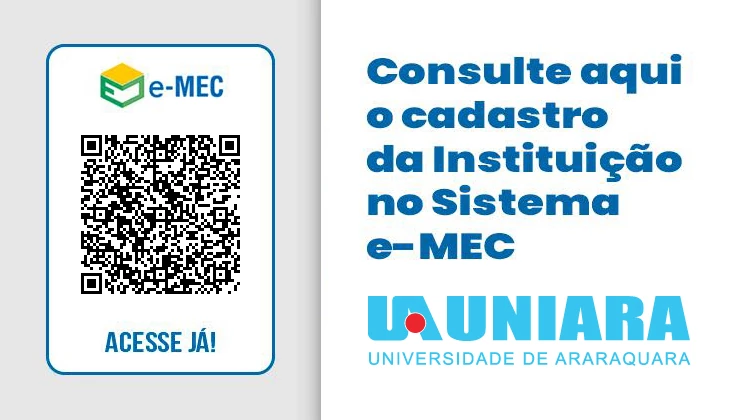The development of the proposal to create the Postgraduate Program at the Master`s and Doctoral level in Biotechnology in Regenerative Medicine and Medicinal Chemistry was the result of the observation of the growth of research carried out by professors/researchers linked to the Department of Biological and Health Sciences (DCBS) of the University of Araraquara - Uniara. At the time, DCBS had 11 undergraduate courses in the areas of Biological Sciences and Health Sciences, significantly contributing to the training of highly qualified professionals in the interior of the state of São Paulo.
In order to structure and integrate research in the respective areas, in 2008, the Research Group on Medicinal Chemistry and Regenerative Medicine (QUIMMERA/CNPq/Uniara) was created. The Group, conceived and created by professors/researchers André Capaldo Amaral, Wilton Rogério Lustri and Pedro Paulo Corbi, aimed to include Uniara in the national scenario of Higher Education Institutions (HEIs) committed to frontier research in these areas. Since then, several research projects have been proposed and developed, contemplating a biotechnological approach, in collaboration with professors/researchers from public institutions renowned for research excellence, such as the Chemistry Institute of the São Paulo State University - UNESP, Federal University of São Carlos - UFSCar, State University of Campinas - Unicamp and University of São Paulo - USP/São Carlos. This inter-institutional interaction also made it possible to expand the number of researchers who were part of the QUIMMERA/CNPq/Uniara group.
The first projects, involving undergraduate students from various courses in the health area at Uniara, resulted in several publications in national and international scientific congresses. In parallel to the expansion of projects and partnerships of the QUIMMERA/Uniara group, the Uniara Rectory expressed, in 2012, its interest in expanding the scope of its stricto sensu academic Postgraduate Programs (PPG). The initial proposal was to create a program related to the area of Medicine and Health, considering the institutional representation of undergraduate courses in this area, linked to the Department of Biological and Health Sciences (CBS). To achieve this goal, in early 2013, a commission was set up to start planning and preparing a project for the creation and implementation of a PPG at the Academic Master`s and Doctorate level in Biotechnology, applied to medicine and health. The choice of the Biotechnology area was also based on the characteristics of Uniara itself, considering its interdisciplinary pedagogical matrix in the areas of Biological, Natural and Human Sciences and the strategic influence of Biotechnology for emerging countries, with perspectives of socioeconomic and science and technology projection.
After conducting a thorough study, the creation of the Postgraduate Program in Biotechnology in Regenerative Medicine and Medicinal Chemistry (PPGB-MRQM) was suggested. The scarcity of programs, in Araraquara and region, in Biotechnology, with emphasis on the subject, is also highlighted, strengthening the differential character of the PPGB-MRQM proposal. It is noteworthy that the research area of Regenerative Medicine and Medicinal Chemistry represents a frontier in the world research scenario, starting a new and promising proposal. To meet the proposal in concentration in Biotechnology, two lines of research were created that are complementary: Line 1 - Biotechnology in Regenerative Medicine and Tissue Engineering; and Line 2 - Medicinal Chemistry and Biopolymers, which cover the areas of concentration of research already established at Uniara.
The faculty, which would integrate the permanent nucleus (NP), was made up of professors with PhDs and post-docs, among them young researchers and senior researchers, with diversified academic training, characterizing the essential concept of multi and interdisciplinarity. The composition of the group of professors, in line with the curricular structure proposed for the creation of the PPGB-MRQM, reflected, and still reflects, the course`s purposes of offering graduates a differentiated training focused on teaching, at the undergraduate and postgraduate level, and research in Biotechnology in Regenerative Medicine and Medicinal Chemistry, with additional training to plan and coordinate the execution of research projects in the academic and industrial sectors.
With all the goals achieved to obtain the necessary prerequisites for the opening of a Postgraduate Program in Biotechnology, in 2014, the filling was carried out and APCN submission. On January 5, 2015, the opinion of the Technical-Scientific Committee on Higher Education (CTC-ES/CAPES) was released approving the merits of the proposal to open the Academic Postgraduate Program in Biotechnology at Uniara for Master`s and Doctoral courses (number 1491/2014). The approval by the Minister of State for Education of the opinion of the Chamber of Higher Education of the National Council of Education, in favor of recognition, was registered in the Official Gazette of the 11th of January 2017.









